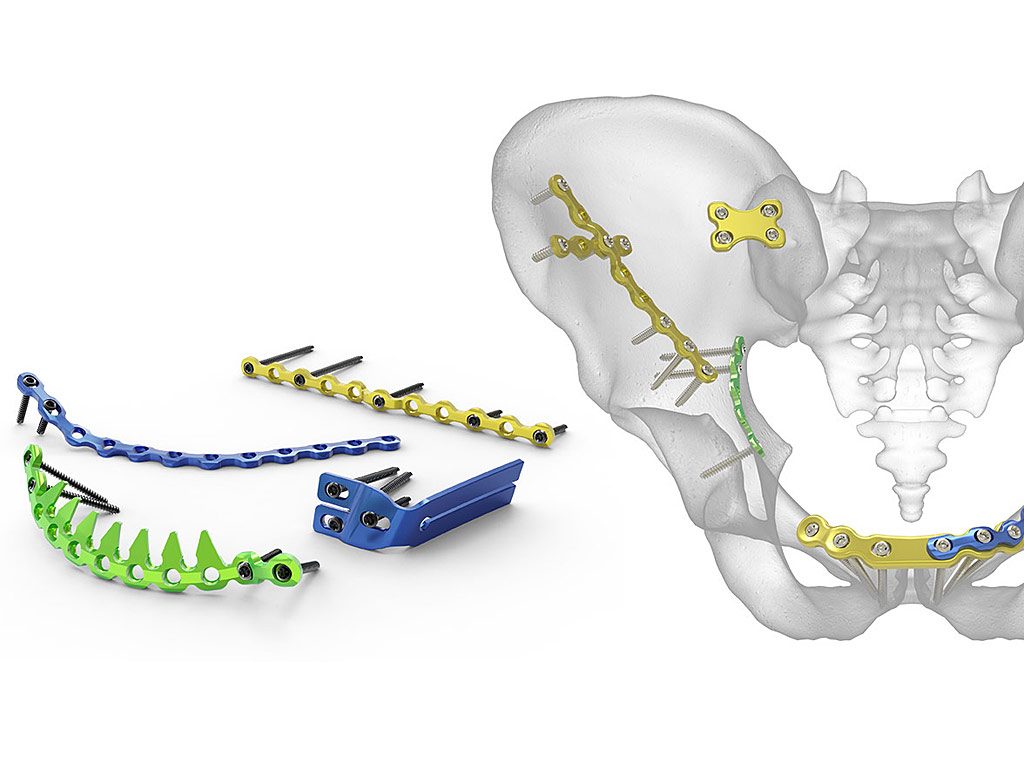
Pelvic Plating System
March 27, 2018
Overview The Acumed Pelvic Plating System is a comprehensive set of plates, screws, and instrumentation designed for fractures, fusions, and osteotomies of the acetabulum, sacrum, ilium, and pelvic ring. The Pelvic Plating System can also be used for sacroiliac joint dislocations and pubic symphysis disruptions. The implants in the Pelvic Plating System are strategically precontoured where it may save time …
Overview
The Acumed Pelvic Plating System is a comprehensive set of plates, screws, and instrumentation designed for fractures, fusions, and osteotomies of the acetabulum, sacrum, ilium, and pelvic ring. The Pelvic Plating System can also be used for sacroiliac joint dislocations and pubic symphysis disruptions.
The implants in the Pelvic Plating System are strategically precontoured where it may save time for the surgeon and left uncontoured where patient anatomy may require personal contouring.
Indications for Use
- Fractures, fusions, and osteotomies of the acetabulum
- Fractures, fusions, and osteotomies of the sacrum
- Fractures, fusions, and osteotomies of the ilium
- Fractures, fusions, and osteotomies of the pelvic ring
- Sacroiliac joint dislocations
- Pubic symphysis disruptions
Anterior Brim Plate
The Anterior Brim Plate is precontoured in places where it may save time for the surgeon and uncontoured in areas where manual bending may be preferred. The plate is available in 12- and 14-hole configurations to accommodate varying patient anatomies. Slots and holes on the anterior end of the plate are designed to interface with the Acumed Pubic Symphysis Plate, if desired.
Intrapelvic Plate
The Intrapelvic Plate is precontoured to approximate the anatomy of the medial wall of the pelvis below the pelvic brim and aid in the buttressing of fractures. The Intrapelvic Plate has four angled posterior holes that are designed to direct screws away from the acetabular joint and is available in 5-and 9-hole configurations to accommodate varying patient anatomies.
Posterior Wall Acetabular Plate
Designed to address the most common type of acetabular fracture, the Posterior Wall Acetabular Plate is precontoured distally to match the curvature of the ischial tuberosity. The proximal end of the plate is left uncontoured with the proximal holes grouped together for optimized bone purchase away from the acetabular joint.
Curved Posterior Wall Acetabular Fragment Plate
The Curved Posterior Wall Acetabular Fragment Plate features a precontoured distal end, designed to match the anatomy of the ischial tuberosity. Prongs along the center region of the plate spread out to capture comminuted fractures of the acetabular wall, while the proximal end curves around the acetabular cup. Proximal screw placement is intended to optimize bone purchase while avoiding the acetabular joint. The plate can be further contoured and trimmed as necessary.
Acetabular Spring Plate
Specifically designed to address fractures of the posterior wall of the pelvis, the Acetabular Spring Plate is available in 2- and 3-hole configurations to accommodate varying patient anatomies. Prongs incorporated into the lateral end of the plate are intended to help retain fragments in the posterior wall, while the center slot allows for fine-tuning of plate placement. In addition, the Acetabular Spring Plate can be used with other plates in the Acumed Pelvic Plating System.
Quadrilateral Surface Plate
The Quadrilateral Surface Plate is designed to buttress the medial wall of the acetabulum. Separated tabs incorporated into the plate are intended to offer two points of contact on the medial wall, and add stability to the fragment. The Quadrilateral Surface Plate can accommodate screw placement on either the pelvic brim or in the medial wall, and is able to be used in conjunction with the Anterior Brim Plate, if desired.
Pubic Symphysis Plate
The Pubic Symphysis Plate is precontoured to approximate the anatomy of the pubic crest. Available in 4- and 6-hole configurations, the plate can accommodate varying patient anatomies to address disruptions of the Pubic Symphysis joint. The plate features two compression slots, one for each side of the pubic symphysis joint. Each compression slot offers 1 mm of compression, allowing for up to 2 mm of compression total. The slots of the plate are designed to interface with the Acumed Anterior Brim Plate, if desired.
Sacroiliac Plate
The Sacroiliac Plate allows for two screws to be placed on either side of the sacroiliac joint, thereby requiring only a single plate for joint fixation. The plate has a contoured undersurface, intended to match the natural arch in patient anatomy over the sacroiliac joint. Two screw slots facilitate fine-tuning of the plate placement before final fitting of the plate.
3.5 mm Reconstruction Plate
The 3.5 mm Reconstruction Plate is made available in 3- to- 16-hole configurations, providing an array of options to address many different fracture patterns within the pelvis. Additionally, these plates can be contoured and trimmed as necessary to further accommodate the various regions of the pelvis. In order to allow for the treatment of a wide variety of pelvic fractures, the Acumed 3.5 mm Interlocking Reconstruction Plate is designed to overlay other plates in the Pelvic Plating System. In addition, the plate can be contoured and trimmed, as necessary, to address many different fracture patterns of the pelvis.